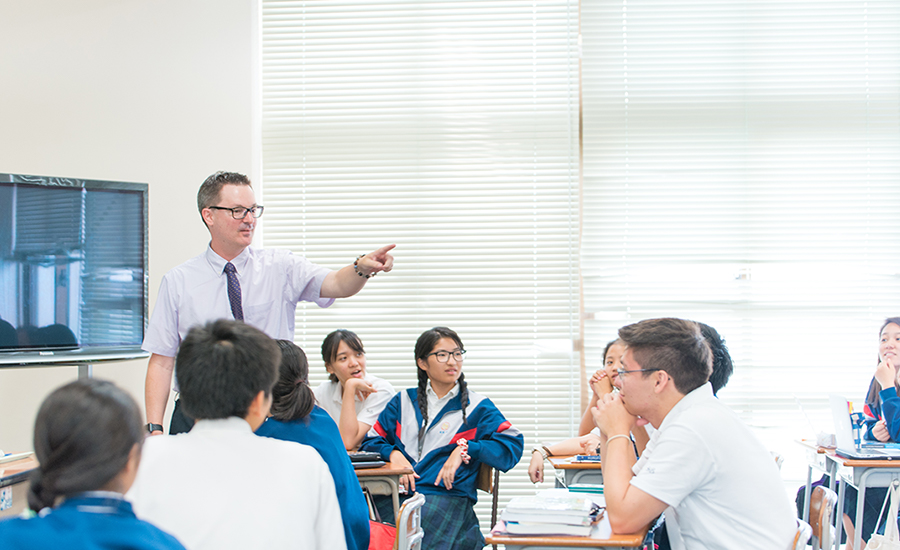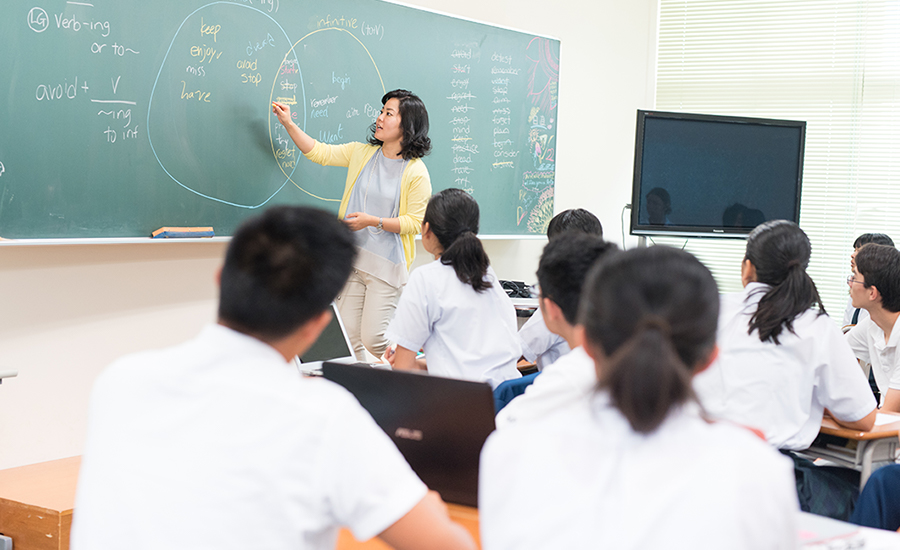国際文化科学コース(国際バカロレア)
- HOME
- What is Okinawa Shogaku?
- School introduction (Japanese)
- 国際文化科学コース(国際バカロレア)
“International Baccalaureate” (IB) is a comprehensive curriculum designed by the International Baccalaureate Organization (Headquartered in Switzerland). The “IB Diploma” is awarded to students who have attained the required score upon graduation. This diploma can be used as a qualification for admission to some foreign and domestic universities.
What's Up, IB?
Curriculum

Our school’s International Department of Humanities and Science (IB Course) provides a bilingual curriculum in English and Japanese. This includes the International Baccalaureate curriculum (Dual IBDP), classes essential for the qualification for graduating Japanese senior high school (Physical Education, Home Economics, Information, etc.), and an Okinawan Karate class. Students in the IB Course can receive both a Japanese senior high school qualification and an IB Diploma upon graduation. The six classes required for the IB examination are Japanese Literature, English B, History, Experimental Science (Biology / Chemistry), Mathematics, and Visual Arts. Additionally, students take TOK (Theory of Knowledge), CAS (Creativity, Activity, Service), Karate, Physical Education, and Information Technology. English B and Mathematics must be taken in English and History and TOK may be taken in English or Japanese. Other classes are held in Japanese. Students may also choose the language of some IB examinations. For the IB diploma to be awarded, students must achieve passing marks on the final examinations and Internal Assessments. The IB curriculum is 2 years. Before starting the IB diploma curriculum, first year high school students will follow a Pre-IB curriculum focused on graduating from a Japanese high school. Higher Level credits earned in IB may allow students to earn university credits at some overseas universities.
Characteristic of the IB course

Most IB textbooks are written in English, so IB Course students are required to have achieved EIKEN grade pre-1 level English proficiency by 11th grade. Also, students are required to study math and science at the level of our school’s Rikei course, which is specified in that course description. However, students in the IB Course study without the boundaries of Rikei and Bunkei courses, focusing on languages, history, and other subjects such as ethics. Classes are composed of around 20 students, and presentations and discussions are held more frequently than in other courses. In the IB course, there are both students who aim to study abroad and students who want to go to Japanese universities where classes are held in English. Besides EIKEN, students take IELTS and SAT once a year during the 11th and 12th grades. For university admissions, students may aim for admission using the IB diploma, the National Center Test for University Admissions, AO (Admission Office) admission, school recommendation admission, and general entrance exams. In the past, about one-third of IB students attended universities abroad and the rest attended Japanese universities.
- Implementations of classes are carried out in English (English, History, and TOK (Theory of Knowledge).
- Studies for IELTS (International English Language Testing System) and SAT (Scholastic Aptitude Test).
- We offer a special course for cross-cultural understanding.
- Students have the option to go to affiliated universities in the U.S. and Australia with potential scholarships.
- Okisho has foreign instructors specializing in our International Baccalaureate Program.
- Many of Okisho’s teachers have graduated from foreign universities and graduate schools.
The quota and abilities required to become IB Course students
The maximum class limit for an IB course is 25 students at every grade. In order to study in our IB Course, students are required to have comprehensive and basic knowledge, such as the a high level of English Communication skills as well as mathematics, the Japanese Language, Science, and Social studies. For this reason, those who have the intention of starting to study in an IB course from high school must have an English proficiency of over Eiken Grade Pre-2 in order to apply for the course. Their levels of wide and foundational knowledge such as Japanese Language, mathematics and etc. will be reviewed by school reports (on students' grades and conduct) and entrance exams.
5 policies
Six characteristic of IB
01
The International Baccalaureate Organization (Headquartered in Switzerland) provides worldwide curriculum with certified schools.
02
The IB’s aim is to contribute to promoting the cultivation of multiple intelligences and international education.
03
The “IB Diploma” is awarded to students who have attained the required score upon graduation. This diploma can be used as a qualification for admission to some foreign and domestic universities.
04
Students decide research assignments related to subjects that they have been studying, then carry out research and write academic papers.
05
The IB Course examines systems of knowledge in each academic field from the interdisciplinary viewpoint and cultivates rational thinking and objectivity. Furthermore, the course recognizes the diversity of language, cultures, and traditions and deepens international understanding.
06
In the IB Course, students get out of classrooms and gain experience in the broader society, learning the importance of cooperativeness, compassion, and practice by working with various kinds of people.






